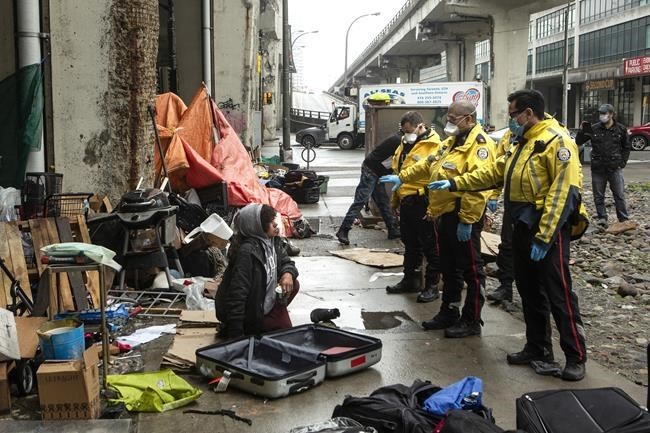TORONTO — Authorities in some provinces ramped up often arbitrary law enforcement to help curtail the COVID-19 pandemic rather than rely on a purely public health approach, according to a report out Wednesday.
The main problem, the report finds, is that marginalized or other vulnerable groups tended to bear the brunt of police and bylaw action.
"This report proves that we've got an ugly ticketing pandemic, replete with COVID carding and racial profiling, in central and eastern Canada," Michael Bryant, executive director of the Canadian Civil Liberties Association said in a statement. "Somehow a public health crisis has been twisted into a public order crisis."
Provinces across the country issued emergency orders with hefty penalties for violations in March, including closures of public spaces and physical distancing measures. Ticketing soon followed.
In one example cited in the report, a man walking his dog in Ottawa was fined $880 for standing in the wrong place. A bylaw officer in the city also tackled a man walking through a park with his daughter. He ended up with a bruised lip and a fine of more than $2,000.
One woman with her baby in Aurora, Ont., stepped off a park path to let others pass and was ticketed $880, prompting Premier Doug Ford to say the officers "could have used a little bit different judgment."
According to the study by the association and the Policing the Pandemic Mapping Project co-founded at the universities of Toronto and Ottawa, police and bylaw officers issued at least 10,000 tickets or charges related to the pandemic between April 1 and June 15. The value of the fines was more than $13 million.
Quebec accounted for 77 per cent of the reported fines, while Ontario saw 18 per cent and Nova Scotia three per cent.
The findings, based in part on publicly available information such as news and police reports, were supplemented by reports from more than 100 people who reported COVID-related stops, searches and charges through the association's online tracker.
Some said there was no basis for their tickets. Others maintained any infraction was trifling.
"Many of the experiences Canadians shared demonstrate how over-zealous, technical enforcement of confusing, broad and vague laws frequently led to fines that were completely disconnected with the goal of protecting public health," states the report called "Stay off the Grass: COVID-19 and Law Enforcement in Canada."
While some provinces such as British Columbia successfully resorted to messaging and other public health strategies to encourage compliance with the various measures, others opted for punitive enforcement.
"Police will be handing out more fines and, I repeat, the fines can vary from $1,000 to $6,000 per person," Quebec Premier Francois Legault said in April. "That's what people who don't respect the rules deserve."
In an interview, report co-author Abby Deshman said large data gaps exist but it is clear discriminatory police action occurred in the context of COVID-19. Black and Indigenous people, the homeless and recent immigrants were among those targeted.
"When the primary response that these communities see is a law-enforcement response, they do not seek help for their health and the health of their communities," Deshman said. "They hide."
Officers also singled out people in same-sex relationships by questioning them about their relationship, while ignoring heterosexual couples, she said.
The hefty fines — often a month's rent or grocery budget — also had a disproportionate impact on recipients such as students, seniors on fixed incomes, single parents or the unemployed.
The report warns against a return to law-enforcement stops, searches and charges should a second COVID wave prompt a reprise of the lockdown. Punitive measures, it says, are simply counterproductive.
"Government leaders must resist the temptation — and the calls from scared constituents — to back up every public health recommendation with the force of law and give a carte blanche to law enforcement," the report states. "Trying to police our way out of this pandemic is unimaginative, sometimes unconstitutional and ineffective."
This report by The Canadian Press was first published on June 24, 2020.
Colin Perkel, The Canadian Press

